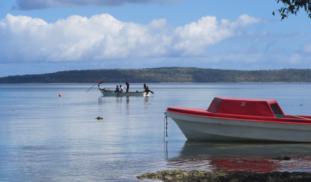Please wait...
About This Project
C2O coasts, climate, oceans
Coral reefs support marine animals, including fish & shellfish that Pacific communities use for food. We are working with communities to collect data on reef condition, fish populations and fish catches. The data will help us understand reef changes from recent cyclone, predation and bleaching damage, and develop local monitoring tools that can inform local actions to improve reef health and promote sustainable fishing so reefs continue to provide food for communities.

Browse Other Projects on Experiment
Related Projects
A sociotechnical toolkit for coral conservation and regeneration
This project aims to develop a sociotechnical toolkit for deploying meaningful biotechnologies in coral...
How does indigenous storytelling communicate best practices for coral reef management on Ulithi Atoll
Coral reef ecosystems are in need of conservation solutions. Indigenous adaptive management, supported by...
How do Black women fishing communities in Ecuador and Madagascar manage mangrove habitats and mitigate climate change?
I'm studying the resilient ways of ILK (indigenous and local knowledge) eco-governance of mangrove habitats...





